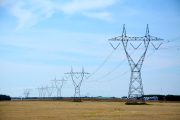Last month I advised landowners to get their water well tested before signing a lease agreement, but there are also other issues that landowners might want to negotiate with a company.
A well or pipeline will be in place for many years, so think about your future farm operations. How will the proposed location of the well or pipeline limit the movement of farm equipment or affect possible plans for buildings or subdivision? If necessary, negotiate with the company to find a better location that will reduce the impact on your activities. The company may be able to change the surface location of a well and, if necessary, use directional drilling to access a down-hole location from an adjacent land surface. Also think carefully about the pipeline route before signing a pipeline right-of-way agreement. The Alberta Energy and Utilities Board (EUB) sets minimum setback distances for wells and pipelines, but landowners may want facilities somewhat farther from their home.
A more distant location is probably desirable if the well will produce sour gas or have noisy equipment. If the company is drilling for shallow gas or coalbed methane, ask if it has plans for a compressor. Noise from compressors is a frequent complaint, but modern compressors can be quiet. Negotiate for quiet equipment.
Well drilling generates large volumes of waste in the form of drilling mud and drill cuttings that require storage and disposal. The chemical composition of drilling mud varies, and it may contain a range of additives, hydrocarbons and salts. The EUB's Guide 50: Drilling Waste Management sets out how a company must dispose of drilling mud, which depends partly on its composition. Current regulations allow the company to put some wastes on the lease site itself, or it can seek permission to use land in the area. Alternatively, the company may remove the wastes for disposal at another location. Decide if you want the company to remove all drilling wastes from your land or to handle them in a certain way.
After a company has drilled a well, it must be tested. The EUB tells companies what they must do in Guide 60: Upstream Petroleum Industry Flaring. Find out how long well test flaring will last and, if flaring is a health concern, ask the company to evaluate alternatives, such as inline testing or the use of a high-efficiency incinerator. The best option will depend on local conditions.
It's a good idea to think about reclamation before any work starts on a well site. Ask the company for a Pre-Construction Assessment Report. This will provide a baseline against which to measure future reclamation work. Such a report is not mandatory but is encouraged by Alberta Environment and the industry.
These are just a few of the things that you will need to think about regarding the lease area or pipeline route. You will also need to think about compensation for the well lease area, including loss of use and adverse effects. Some landowners ask for compensation for the time that they take researching issues, before signing.
Don't forget to write everything that you have agreed with the company as conditions in the lease agreement before you sign it. If you need help with the wording, contact the Office of the Farmers' Advocate. You can do this, free of charge, by dialling the government RITE line at 310-0000.
Once you and the company have signed the agreement, put your copy, together with your water well test results and the Pre-Construction Assessment Report, in a safe place. Hopefully you won't need these papers, but if things do go wrong, then you have a clear record of baseline conditions and what everyone has agreed to.
Dr. Mary Griffiths is an Environmental Policy Analyst with the Pembina Institute. She lives in Edmonton, Alberta. Her book, When the Oilpatch Comes to Your Backyard: A Citizens' Guide is a complete guide to interacting with oil and gas companies and is available from the Pembina Institute (www.pembina.org) or by calling the Drayton Valley office at 780.542.6272.







